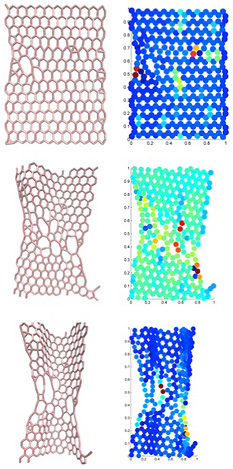
|
 |
Department of Mechanical Engineering graduate students Jerry Cheng and Frank Vangessel used Deepthought2 to explore the failure mechanism of graphene nanosheets at extreme deformation. Graphene is an advanced material with excellent electronic and mechanical properties. |
|
Most students, says Assistant Professor Yifei Mo, never have the opportunity to work with a supercomputer.
That’s why Mo, a computational materials scientist at the University of Maryland, jumped at the chance to design and teach a course in which students were required to use Deepthought2, one of the nation’s fastest university-owned supercomputers.
Any student can apply for an account on the system, Mo says, but few know much about it or how to use it. Despite the growing importance of modeling and simulation to the discovery and implementation of new materials, very few materials science and engineering (MSE) students learn these skills in a classroom.
Mo's course, ENMA 489A: Introduction to Computational Materials Science, offered by the Department of Materials Science and Engineering, was available to both graduate and undergraduate students. Class and lab sessions covered topics including quantum mechanical methods, molecular dynamics and statics, problems in battery and semiconductor design, and computational design. Mo describes it as a bridge between the theories students learn in class and the physical experience of working with materials in a lab.
“The idea was to teach students a variety of computational techniques and how to apply them to either calculating materials properties in order to understand their behavior, or to designing better materials.” he says.
Students used the supercomputer to complete final projects including modeling the failure mechanism of graphene nanosheets, simulating the molecular dynamics of close-packed polyethylene, and simulating the chemical reactivity and performance of functionalized double-walled carbon nanotubes in lightweight soft body armor.
Mo says the course was also designed to contribute to the Materials Genome Initiative, the national call to accelerate the commercial deployment of advanced materials, by equipping the next generation of materials scientists and engineers with computational skillsets they can use in their future work.
Student response to ENMA 489A was positive.
Jon Mecham, a senior majoring in MSE and computer science, says the course gave him a “solid overview” of atomic-level modeling.
“One of the most exciting parts of the course was finding the theoretical properties of materials,” he says. “We learned how to use standard atomistic modeling programs like VASP and GULP, which are useful for anyone who needs to model or simulate materials and their properties.”
Steven Lacey (B.S. ’14, materials science and engineering), also enjoyed the lab-based assignments. “[We had] the opportunity to disseminate code and extract useful material parameters … [and] my final project directly related to the chemical modeling portion of my senior capstone project.”
Lacey, who will join MSE’s Ph.D. program in the fall, already knows how he’d like to apply his new skills. “I will be conducting research related to the least understood portion of alkali metal ion batteries, the solid electrolyte interface,” he explains. “Computational modeling can shed light on the interfacial phenomona within specific electrode-electrolyte systems.”
To learn more about ENMA 489A, contact Assistant Professor Yifei Mo at yfmo@umd.edu. To learn more about Deepthought2, visit the University of Maryland’s Cyberinfrastructure Center web site.
August 12, 2014
|

